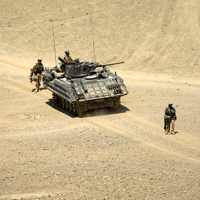When the Netherlands and other European members of NATO invoked Article 5 of the North Atlantic Treaty after the attacks of Sept. 11, 2001, they almost certainly did not anticipate that, in doing so, they would find their armed forces engaged in a decade-long conflict in Afghanistan. The Article 5 declaration -- holding that Sept. 11 was an attack on NATO's collective security -- was intended as a low-cost gesture of trans-Atlantic solidarity with the United States and the traumatized American people, rather than as an operational commitment to wage a protracted and frustrating conflict.
But through NATO, European militaries became sucked into the Afghan vortex. The persistent lack of enthusiasm for the war effort among European publics, skeptical that their vital interests were at stake in Afghanistan and expecting the United States to safeguard those that were, has harmed trans-Atlantic relations, NATO's warfighting credibility and the collective military effort in Afghanistan.
The Dutch experience in Afghanistan is illustrative of the challenges and costs faced by European governments trying to wage an effective counterinsurgency in Afghanistan in the face of the domestic popular opposition to the war. In early 2010, the Dutch government fell due to divisions among the ruling coalition over the Afghan issue. Nonetheless, the pull of alliance solidarity among Dutch leaders and many other NATO governments remains surprisingly strong. Against expectations, the Dutch withdrawal did not trigger a cascade of other NATO withdrawals. And as of this writing, it looks like -- again, against expectations -- the Dutch military might soon be back in Afghanistan, one year after having become the first major NATO government to remove all their combat troops from that country. Despite the fading legacy of Cold War imperatives and all the concerns in Washington about European free riding and pacifism, the trans-Atlantic security paradigm exerts a strong gravitational pull on Europeans.

